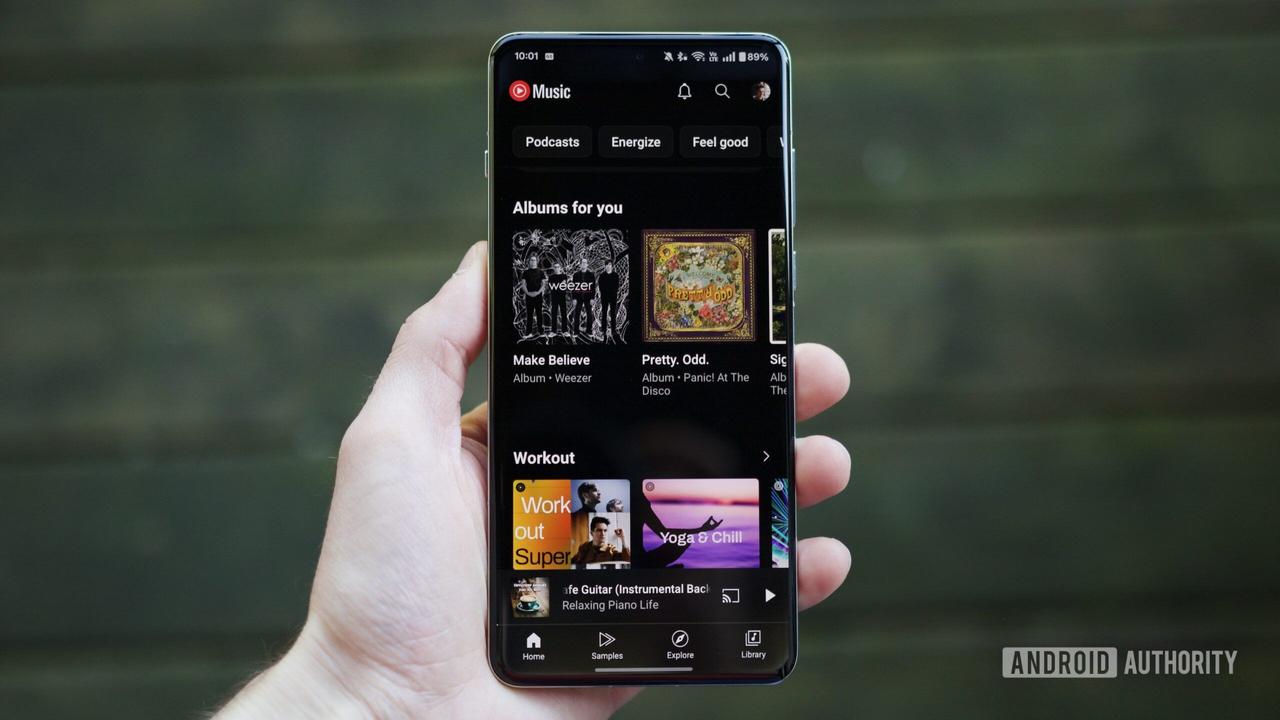The Rise of AI-Generated Music: Exploring Its Impact and Limitations
2 Sources
2 Sources
[1]
I Spent a Week Listening to AI Music, and Here's What I Learned
Key Takeaways AI music is easily accessible on Spotify, SoundCloud, and YouTube. Listening to AI music provides a vast, endless variety of tunes. Despite its novelty, AI music may struggle to connect emotionally with listeners. With surprisingly catchy outcomes, artificial intelligence is generating a plethora of new tunes to try out on popular streaming platforms like Spotify, SoundCloud, and YouTube. While they may be fun at first, I wanted to switch back to traditionally created music by the end of the week for a few reasons. Where to Listen to AI-Generated Music While you can generate AI tunes using an AI music generator, plenty of AI music is already out there, just waiting for someone to hit the play button. YouTube, SoundCloud, and Spotify are great places to find AI-generated music easily. YouTube and SoundCloud AI content is only a search in the search bar away from multiple titles. If you are already a Spotify user, accessing artificial intelligence-generated music is as simple as hitting play on a Spotify-curated playlist. Check out the This Is Beats By AI playlist or Beats By AI Radio. If you're a student, you can even make use of AI outside of listening to new music by putting it to work in the classroom and taking notes. What I Liked About Listening to AI-Generated Music The biggest benefit of listening to AI-generated music is that the resource is essentially endless. While a person can create a finite amount of music and only have access to the skill sets they are born with or curate within a lifetime, AI can pull from vast resources across the web to create an endless variety of lyrics, sounds, and styles. From different vocal ranges a human couldn't even produce, to a harmony of millions of voices, AI is the only avenue to creating some truly outside-of-the-box musical entertainment. While listening to AI music for a week, I enjoyed the fact that I was never bored and could find any genre of music I wished. I also tried my own hand at creating AI music, which was fun. With multiple prompts that honed in on the genre of music I like best, I was able to generate music that was more to my tastes. The Downsides of AI-Generated Music The biggest downside to listening to music by artificial intelligence is the likelihood that, at some point, you will come across a song that makes absolutely no sense at all. It is an incredible tool, and many believe AI has reached a pinnacle, but it is still flawed. While humans would pick up on nuances or bizarre verbiage, AI does not. I certainly wasn't bored listening to music by AI for a week, but I did find myself questioning what the song was referring to multiple times. AI music will most likely always struggle to connect with audiences like traditionally created music does because it cannot live the human experience, which helps to generate our emotions. Music, at its core, is an emotional creation with emotional connection, and without the feeling behind the music, AI-generated content often falls flat. AI Music Falls a Little Flat At the end of the day, AI music is a novelty I enjoyed indulging in for a week, but I won't continue. Throughout the week, I found myself humming the AI tunes and laughing at crazy lyrics, but I never felt a connection to a song like I often do with traditionally created music. Who knows? That might change in time, especially as AI improves and becomes better at understanding and relating to emotions. But currently, its best output is electronic music that doesn't require lyrics (or that elusive emotional connection), which means real, human musicians are still safe for a while longer.
[2]
AI Music Is Seeping Into Every TV Program and Streaming Service, and I Hate It
Turn on your favorite streaming service or scroll through social media, and you'll probably stumble across something AI-generated. There are AI-generated podcasts, professional headshot generators, meme creators, and, of course, AI music and image generators of all kinds. In fact, I'd bet you didn't even realize just how much it has already snuck into the mainstream, including your favorite shows and services. The Pervasiveness of AI Music When I say that AI music is everywhere you look, I am not exaggerating. Streaming services like Spotify are not only using AI playlist tools to help create "personalized" soundtracks, but they also allow and even feature AI-created tracks. This is allowed only if they do not break copyright law by imitating other artists or stealing lyrics, meaning you likely have already come across such songs. On social media platforms like TikTok and Instagram, AI-generated music is often used in video content to provide unique, catchy, copyright-free soundtracks for user engagement. Even the advertising industry is embracing AI to create soundtracks, customize jingles, and create simple backing tracks at low costs. It's also being used to compose, generate ideas, and improve sound design for movie and television scores. Overall, the idea is to make things easier for the creator, and people are embracing the ability (and cost-effectiveness) of the droves, but is it a good idea in the long term? The Good and the Ugly of AI Music On one hand, AI music can offer some considerable advantages. For musicians just starting or independent creators with limited budgets, AI tools can lower barriers to entry by offering cost-effective solutions to composition and production challenges. These tools can generate musical compositions that would have otherwise required a suite of expensive instruments, hiring a band, or needing studio time. AI can also help artists explore new musical avenues, letting them generate new and unexpected sound combinations. They don't have to be restricted by the traditional genres or instruments; instead, they can experiment with different algorithms and discover brand-new creative horizons, all at the push of a few buttons. Yet, despite these benefits, there are also some big downsides. The loss of the "human touch" and originality can't be ignored. Nor can the idea that AI-created music isn't actually creative; it is just an algorithm spitting out information. In this sense, it is very much like the analog versus digital debate, which is more "true" to the original artists' intent. AI music struggles to capture the nuances and imperfections that make human-made music connect with listeners on a deeper level and evoke real emotions within us. There is also the issue of sounding too much like, or even straight-up copying, "real" artists. We saw this just last year when a TikToker named Ghostwriter977 generated an entire album featuring popular artists TheWeeknd and Drake. The album gained massive popularity, but was quickly taken down for copyright violations. This will only happen more often, and traditional artists will have to stand up for their creative rights because of it. Music Without Emotion Another downside is that while AI music can sound good, the complexity of sound and emotion is something that AI just can't quite grasp. This is true whether AI is being used to create new music or as a stand-in for other artists. Take, for instance, how AI has been used to mimic the signature vocals of artists like Linkin Park's Chester Bennington. I must admit that, as a fan devastated at his passing, it would be good to hear him again. Unfortunately, while it can be fun and nostalgic to hear other songs in his signature style, the results come across as jarring and inauthentic. Our ears are finely attuned to the expressive power of music, hearing the excitement, pain, or anger behind every note, which isn't something AI can replicate. At least, not yet (and hopefully not ever). AI Doesn't Sound as Good, and You Can Tell the Difference While I can see the benefits of AI, I hate hearing it played out loud. To me, it sounds inauthentic, and as soon as I notice it, that is all I can pay attention to. It's like noticing the incorrect details in AI "art." Something is always wrong, like too many fingers or lines that go nowhere, and AI music is the same. Lyrics might sound 'alright' at first, but something is lacking. Or the tones of the music and vocals technically work, but the emotion behind them just isn't there. Plus, while the idea of being able to just 'make' music by plugging ideas into an AI algorithm might appeal to some, I believe it should never override the real creativity of human-generated music. This means that finding a balance between AI's benefits, i.e., its ease of use and accessibility, and its drawbacks will be a major question mark in the future. And to make sure AI is used correctly without hurting artists, we are going to need push-back from listeners everywhere.
Share
Share
Copy Link
An in-depth look at the growing presence of AI-generated music in various platforms and its implications for the music industry, listeners, and artists.

The Proliferation of AI-Generated Music
Artificial Intelligence (AI) is making significant inroads into the music industry, with AI-generated music becoming increasingly prevalent across various platforms. Popular streaming services like Spotify, SoundCloud, and YouTube now host a plethora of AI-created tunes, making them easily accessible to the general public
1
. This trend is not limited to music streaming platforms; AI-generated music is also seeping into television programs, social media content, and advertising2
.Advantages of AI in Music Creation
The rise of AI in music production offers several benefits. For emerging musicians and independent creators with limited resources, AI tools provide a cost-effective solution to composition and production challenges. These tools can generate musical compositions that would otherwise require expensive instruments, studio time, or hiring musicians
2
. Additionally, AI allows artists to explore new musical avenues and experiment with unconventional sound combinations, potentially leading to innovative creative horizons2
.The Listener's Experience
From a listener's perspective, AI-generated music offers an endless variety of tunes across different genres. The sheer volume and diversity of AI-created content ensure that listeners are never bored and can always find something new
1
. However, this novelty comes with its own set of challenges. Many listeners report that AI-generated music often lacks the emotional depth and authenticity found in human-created music1
2
.Challenges and Limitations
Despite its potential, AI-generated music faces several significant hurdles:
-
Emotional Connection: AI struggles to capture the nuances and imperfections that make human-made music emotionally resonant with listeners
2
. -
Lyrical Coherence: AI-generated lyrics can sometimes be nonsensical or lack the subtle meanings human songwriters infuse into their work
1
. -
Copyright Issues: There have been instances of AI-generated music closely mimicking or even copying existing artists' styles, raising copyright concerns
2
. -
Authenticity: Many listeners can detect a certain "flatness" or lack of genuine emotion in AI-created music, which can be jarring once noticed
2
.
Related Stories
Industry Implications
The music industry is grappling with the implications of AI-generated content. While it offers new opportunities for creation and experimentation, it also poses challenges to traditional artists and the very nature of musical creativity. The industry will need to find a balance between leveraging AI's benefits and preserving the irreplaceable human element in music creation
2
.Future Outlook
As AI technology continues to evolve, its role in music creation is likely to expand. However, the current limitations suggest that human musicians are not at risk of being replaced entirely. The future may see a hybrid approach, where AI assists human creativity rather than supplanting it entirely
1
2
.In conclusion, while AI-generated music represents a significant technological advancement with numerous applications, it currently falls short in replicating the emotional depth and authenticity of human-created music. As this technology continues to develop, finding the right balance between AI assistance and human creativity will be crucial for the future of the music industry.
References
Summarized by
Navi
Related Stories
YouTube Music users furious as AI slop floods recommendations, threatening paid subscriptions
06 Jan 2026•Technology

AI Music Generation Tools Spark Debate and Disruption in the Music Industry
01 Sept 2025•Technology

Major Labels Embrace AI Music Platforms After Copyright Battles, Raising Artist Concerns
16 Dec 2025•Entertainment and Society

Recent Highlights
1
Pentagon threatens Anthropic with Defense Production Act over AI military use restrictions
Policy and Regulation

2
Google Gemini 3.1 Pro doubles reasoning score, beats rivals in key AI benchmarks
Technology

3
Anthropic accuses Chinese AI labs of stealing Claude through 24,000 fake accounts
Policy and Regulation





